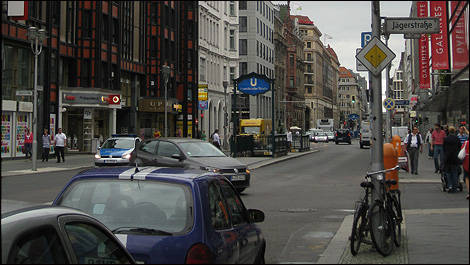I've recently returned from a very short trip to Berlin, Germany and its surrounding areas. While I was only there for a few short days, I was still able to experience what it was like to share the road with a breed of driver I've not seen before.
From the city streets of Berlin to the winding country roads of the surrounding outskirts, I drove the brand-new, 21st-century Beetle alongside German perfection; and I'm not talking about the cars I shared the road with.
It's a common stereotype that Germans are better drivers, so I decided to put that stereotype to the test and do some in-depth research, auto-journalist style, to see if there was any truth to the rumours.
Firstly, I took to the streets behind the wheel. What better way to learn the truth than to experience it first-hand, right? Aboard the 2012 Beetle, I traversed the busy Berlin streets. While the roads were packed with German-bred vehicles, traffic was not an issue. Cars flowed easily, laws were obeyed and courtesy was shown.
I quickly learned that the sequence of traffic lights plays an important role in that flow. While still red, yellow will light, and that's when you should start rolling forward. Green will follow shortly after and red will turn off. But if you're not moving when the yellow alights, you're putting a kink in the beautifully well-oiled machine that is the Berlin downtown core.
Outside the city and on the wide-open streets of the Autobahn, I learned another important rule: Flashing your lights is not polite in Germany. Neither is honking. Germans have a certain amount of respect for one another on the road and generally pay attention to those around them. On the speed-limit-free stretches of the Autobahn, not once did I have to "ask" another motorist to move out of my way. And likewise, I was sure to move out of the way for fast-moving traffic behind me (despite my 160 km/h speed).
Only once did I experience German road rage, and in all honesty it wasn't bad at all (and entirely my fault). I was hesitant in a turn, in the wrong lane in fact, so I held up the flow. As soon as my turn was made, the Audi behind me quickly overtook me, cut sharply in front of me, tapped his brakes inches from my bumper, then continued on his way. A slap on the wrist for my novice mistake.
So, how is it that German drivers are so talented behind the wheel? Again, I decided to ask an expert: A German driver.
On my way to the airport, I had a chat with our valet driver, a young German man no older than myself I'd guess. I drilled him on the process German citizens go through in order to obtain a driving license and keep it; and I have to say I was quite shocked.
While some might think Germans get their license at an older age than North Americans, such is not the case. A license can be obtained at the age of 16, however, that 16-year-old must drive with a 25-year-old passenger until he/she is 18. At 18, you get a full license—but only at 18.
To obtain your license you must first take 20-30 hours of theory lessons, in a classroom. At the same time, you take your practical lessons in a car on the road. Once you've docked your hours of study, you have to write your theory exam. The exam is generally 4-5 pages long with questions that are worth points.
You never know what points each question will be worth and you can only miss 10 points or you fail. Sometimes questions require choosing the correct response from a multiple choice, sometimes they require crossing out all the wrong answers and leaving the right one blank—you never know what you're going to get.
If you fail your theory exam, you have to wait 6-8 weeks before you can take the test again.
However, should you pass the theory exam, you can then move on to your practical test. The driving test lasts anywhere from 30-90 minutes. Your teacher sits in the passenger seat and your test-grader sits in the back.
If you pass everything, after you've paid 200+ euros to do so, you're rewarded with paying approximately 2,000 euros (about $2,700 CDN) more to keep that license. Perfection clearly comes at a high price.
Perhaps some of the most interesting tidbits of information I received from our driver were the following facts:
- All Germans are retested when they reach the age of 60 and then 65 again (amazingly good idea, right?);
- For those who drive buses, taxis and large trucks, retesting is required every 5 years;
- Valet drivers, like ours, are required to take physical exams (eye test, reaction time, etc.) to determine their aptitude behind the wheel and they get to pay an extra 250 euros for that;
- German police give more points for running a stop light than they do for going 20 km/h over the speed limit;
- The more traffic violations you have in a row, the more points you're given and the higher the price of the ticket;
- Getting stopped for a DUI will see your license seized for 3 months.
After all these rules, regulations and facts were given to me, our valet driver brought up a very important point to me: German drivers are good because they have to be; after all, you have to trust those around you to have confidence and aptitude behind the wheel when you're doing 250 km/h on the open Autobahn.
From the city streets of Berlin to the winding country roads of the surrounding outskirts, I drove the brand-new, 21st-century Beetle alongside German perfection; and I'm not talking about the cars I shared the road with.
It's a common stereotype that Germans are better drivers, so I decided to put that stereotype to the test and do some in-depth research, auto-journalist style, to see if there was any truth to the rumours.
Firstly, I took to the streets behind the wheel. What better way to learn the truth than to experience it first-hand, right? Aboard the 2012 Beetle, I traversed the busy Berlin streets. While the roads were packed with German-bred vehicles, traffic was not an issue. Cars flowed easily, laws were obeyed and courtesy was shown.
 |
| Photo: Miranda Lightstone/Auto123.com |
I quickly learned that the sequence of traffic lights plays an important role in that flow. While still red, yellow will light, and that's when you should start rolling forward. Green will follow shortly after and red will turn off. But if you're not moving when the yellow alights, you're putting a kink in the beautifully well-oiled machine that is the Berlin downtown core.
Outside the city and on the wide-open streets of the Autobahn, I learned another important rule: Flashing your lights is not polite in Germany. Neither is honking. Germans have a certain amount of respect for one another on the road and generally pay attention to those around them. On the speed-limit-free stretches of the Autobahn, not once did I have to "ask" another motorist to move out of my way. And likewise, I was sure to move out of the way for fast-moving traffic behind me (despite my 160 km/h speed).
Only once did I experience German road rage, and in all honesty it wasn't bad at all (and entirely my fault). I was hesitant in a turn, in the wrong lane in fact, so I held up the flow. As soon as my turn was made, the Audi behind me quickly overtook me, cut sharply in front of me, tapped his brakes inches from my bumper, then continued on his way. A slap on the wrist for my novice mistake.
So, how is it that German drivers are so talented behind the wheel? Again, I decided to ask an expert: A German driver.
On my way to the airport, I had a chat with our valet driver, a young German man no older than myself I'd guess. I drilled him on the process German citizens go through in order to obtain a driving license and keep it; and I have to say I was quite shocked.
While some might think Germans get their license at an older age than North Americans, such is not the case. A license can be obtained at the age of 16, however, that 16-year-old must drive with a 25-year-old passenger until he/she is 18. At 18, you get a full license—but only at 18.
To obtain your license you must first take 20-30 hours of theory lessons, in a classroom. At the same time, you take your practical lessons in a car on the road. Once you've docked your hours of study, you have to write your theory exam. The exam is generally 4-5 pages long with questions that are worth points.
You never know what points each question will be worth and you can only miss 10 points or you fail. Sometimes questions require choosing the correct response from a multiple choice, sometimes they require crossing out all the wrong answers and leaving the right one blank—you never know what you're going to get.
If you fail your theory exam, you have to wait 6-8 weeks before you can take the test again.
However, should you pass the theory exam, you can then move on to your practical test. The driving test lasts anywhere from 30-90 minutes. Your teacher sits in the passenger seat and your test-grader sits in the back.
If you pass everything, after you've paid 200+ euros to do so, you're rewarded with paying approximately 2,000 euros (about $2,700 CDN) more to keep that license. Perfection clearly comes at a high price.
Perhaps some of the most interesting tidbits of information I received from our driver were the following facts:
- All Germans are retested when they reach the age of 60 and then 65 again (amazingly good idea, right?);
- For those who drive buses, taxis and large trucks, retesting is required every 5 years;
- Valet drivers, like ours, are required to take physical exams (eye test, reaction time, etc.) to determine their aptitude behind the wheel and they get to pay an extra 250 euros for that;
- German police give more points for running a stop light than they do for going 20 km/h over the speed limit;
- The more traffic violations you have in a row, the more points you're given and the higher the price of the ticket;
- Getting stopped for a DUI will see your license seized for 3 months.
After all these rules, regulations and facts were given to me, our valet driver brought up a very important point to me: German drivers are good because they have to be; after all, you have to trust those around you to have confidence and aptitude behind the wheel when you're doing 250 km/h on the open Autobahn.


